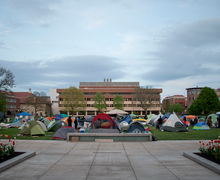SU will have a fall break starting next year
Joe Zhao | Contributing Photographer
Chancellor Syverud said that the four-day weekend fall break will be between Labor Day and Thanksgiving starting next year.
To support student journalism and the content you love, become a member of The Daily Orange today.
Syracuse University will offer a fall break starting in 2023, Chancellor Kent Syverud announced at Wednesday’s University Senate meeting.
The break, which will last for four days and fall sometime in between Labor Day and Thanksgiving, comes after a heavy push from SU’s Student Association, Syverud said. SA first proposed a fall break last spring as part of SA president David Bruen’s plan to increase the amount of wellness days in SU’s calendar.
During his address, the chancellor also discussed the recently announced Micron facility, which will be the largest private investment in the history of New York state. The project requires $100 billion in funding.
SU, which played a role in recruiting the company to the area, plans to partner with Micron by collaborating on research and development, providing student internships and creating a pipeline of SU students to work with the company.
“We have to move quickly and creatively to realize the full potential of this opportunity,” Syverud said. “How prepared and proactive we are as a university will really have a direct impact on our success and the success of Micron in the region.”
Though the Micron plant will have many positive benefits for SU, Senator Sam Gorovitz said the university needs to be cautious of employees switching to work for the company.
“Micron will need lots of talented staff, and one of the places they are likely to look to for talented, experienced staff is to Syracuse University,” Gorovitz said. “We need to be prepared to resist the loss of many of our fine staff to Micron, which has deeper pockets and may be a particularly attractive employment opportunity.”
Coran Klaver, co-chair of University Senate’s LGBTQA Justice and Advocacy committee, also provided an overview of the committee’s recommendations at the meeting.
Klaver said SU needs to keep its LGBTQ Resource Center sufficiently staffed to meet the increasing student demand, especially after it cut one of its full-time administrative staff members.
“Understaffing has become a barrier in the center’s pursuit of the university’s Diversity, Equity, Inclusivity and Accessibility Strategic Plan commitments,” Klaver said. “Restoring the assistant director position of the center is a first step in meeting student demand and retaining the existing center staff and all the intersectional alliances and connections forged and maintained by that staff.”
Klaver said SU should collaborate with the committee to design and implement DEIA policies in the Office of Human Resources. The university also needs to create a clear timeline for providing and updating online resources for transgender students, and invest in training about LGBTQ student experiences for faculty and staff, she said.
Senator Kellin Tasber, a Graduate Student Organization representative to the University Senate, said the recommendations were “imperative” to supporting the DEIA action plan.
“As a graduate student representative and also a member of the LGBTQ community from the graduate student population, these recommendations would make a huge difference for not only the graduate student population, but I think the student population at large,” Tasber said.

Published on October 26, 2022 at 11:23 pm
Contact Stephanie: [email protected]




